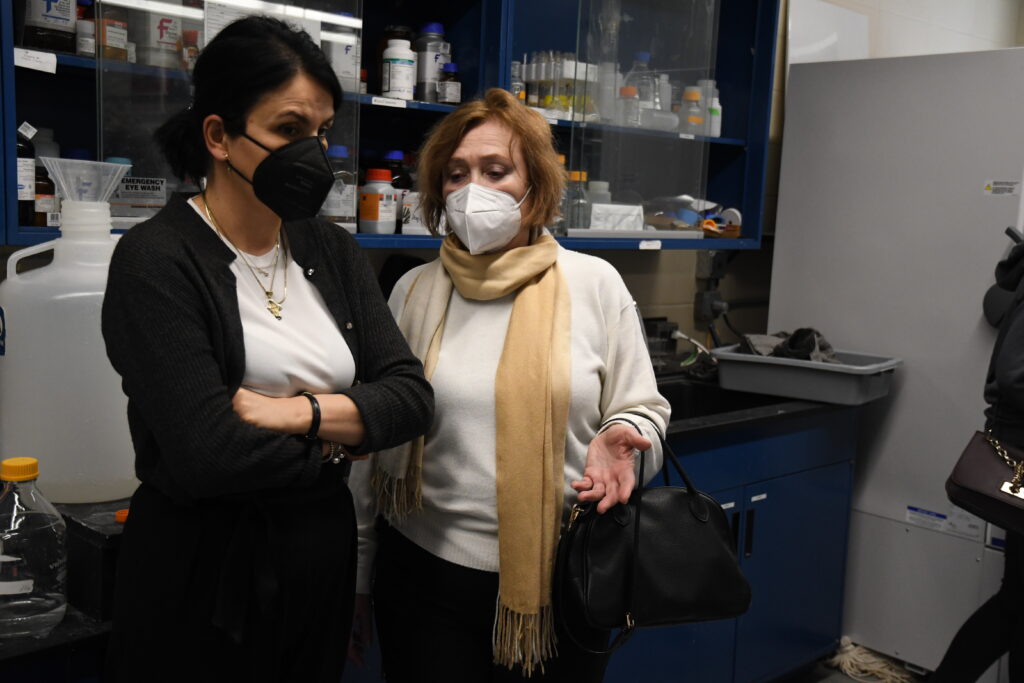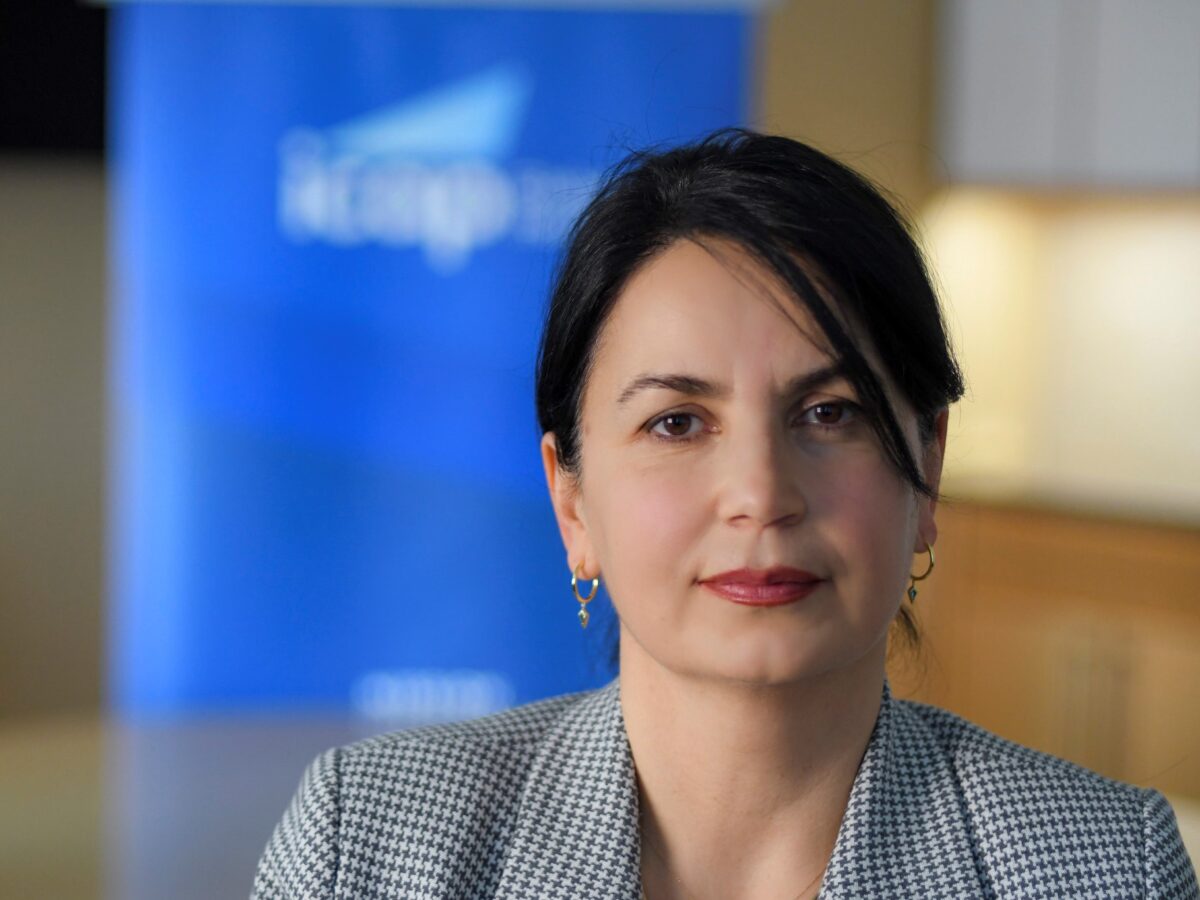In 2022, ICAP launched a COVID-19 wastewater surveillance program in Georgia, in partnership with Georgia’s National Center for Disease Control and Public Health (NCDC) and with support from the Centers for Disease Control and Prevention (CDC). ICAP, in collaboration with the Columbia University School of Engineering and Applied Science, is providing technical assistance to Georgia’s NCDC to develop, plan, and implement the program, and to help build local capacity for interpreting wastewater surveillance data.
As part of that initiative, ICAP hosted a delegation of government health officials from Georgia at its New York headquarters earlier this month, which included a study tour of a Columbia University project testing wastewater in residential halls for signs of COVID-19 before a widespread outbreak can occur. They were accompanied by ICAP’s national program coordinator in Georgia, Ekaterine Pestvenidze, MD, MS, PhD, who gave an interview about the wastewater project, and the importance of strengthening health systems in Georgia and the Central Asian region.
Q: How was Georgia affected by the COVID-19 pandemic?
Georgia was affected severely by COVID-19. At the very beginning, the pandemic trend was slow, however with time the cases started grewing exponentially. Acute increases in the number of daily cases put severe pressure on the health system. At the beginning, almost 100 percent of the cases were hospitalized, aggravating the pressure on the system. Later on, hospitalization policies were adjusted so it got a bit easier and more efficient for the health system to manage.
However, there were still many challenges. Vaccination coverage was not very high. Testing in the entire population, or a large portion of the population, was very resource consuming. Wastewater surveillance in general opens a new opportunity to do massive testing as an alternative way to monitor COVID-19 trends. It’s quite an innovative approach for Georgia and myself, and it can be applied successfully for controlling and tracking the levels of SARS-COV-2 in the country and, importantly, to identify early cases. It’s a robust and sustainable complement to clinical testing that allows us to detect small changes as a signal for early action.
Importantly, we are starting wastewater surveillance of COVID-19, however it can be expanded and used for other pathogens, as well as for antimicrobial resistance, which is a high-priority and challenging area for the Georgian health system.
Q: Why is it important to have ICAP technical assistance for this project?
Georgia already has several years’ experience in wastewater surveillance for polio; however, we believe that ICAP’s experience, specifically with COVID-19 wastewater surveillance, can be well utilized for tracking the presence of SARS-CoV-2 and monitoring trends in the country. And today we had a very valuable opportunity to learn about Columbia University’s extensive experience of applying wastewater surveillance for monitoring COVID-19 within the University. We feel well-equipped with the relevant knowledge and ready to duplicate this successful model for the Georgian reality.

During the delegation’s visit to Columbia’s wastewater surveillance lab, Pestvenidze speaks with Tamar Kutateladze, MD, PhD, Head of the Department of Virology, Molecular Biology, and Genome Research, R. Lugar Center for Public Health Research, at Georgia’s National Center for Disease Control & Public Health (NCDC). The visiting delegation also included Ekaterine Zangaladze, MD, PhD, Head Molecular Epidemiology Laboratory, R. Lugar Center for Public Health Research, NCDC.
Q: What are your long-term hopes for addressing this pandemic and other pandemics or health emergencies in Georgia?
For ICAP, it’s very important to support Georgia to improve and build capacity for surveillance systems, which is one of the ways to address future threats to public health. ICAP is also working and supporting Georgia in building the capacity of field epidemiologists, which makes a valuable contribution to raising national preparedness for global health threats.
Q: Can you talk about ICAP’s work in the region?
Actually, the work ICAP is doing in the region is not only limited to Georgia. ICAP contributes substantially to the capacity building for field epidemiologists in neighboring countries who are also facing a shortage of frontline professionals. Importantly, a large group of public health professionals from Ukraine participate in and benefit from a rigorous field epidemiology training program, organized by ICAP with CDC support. A regional approach is of critical importance when we are trying to accelerate efforts towards global health security, given that communicable diseases don’t have borders.
Q: As a public health professional, what do you hope to achieve for your country and for the world?
First of all, I would like to achieve my vision in which public health is secured both within my country and globally, and the health and well-being of the people is safeguarded. For Georgians, I think the COVID pandemic unequivocally demonstrated that no country, including Georgia, was properly prepared for an unexpectedly emergent public health threat. As such, establishing a strong system with resilient health security capacity for global threat preparedness is vital to ensure my country’s stability, development, and population health.
Q: Why did you go into public health?
To apply a systems approach to protect the health of the population, promote good public health standards and preventive actions, and to make a difference. At the very beginning of my professional career, I worked as a clinical doctor, a pediatrician, dealing with health of individual patients. Later I was privileged to join a very successful project that profoundly transformed and advanced maternal and child health in Georgia, thus making a tremendous impact at the national level. That was when I made a decision to shift away from individual clinical practice and dedicate my professional career to public health. I wanted to follow my growing passion for building bridges to a healthier population.
About ICAP
A major global health organization that has been improving public health in countries around the world for two decades, ICAP works to transform the health of populations through innovation, science, and global collaboration. Based at Columbia Mailman School of Public Health, ICAP has projects in more than 40 countries, working side-by-side with ministries of health and local governmental, non-governmental, academic, and community partners to confront some of the world’s greatest health challenges. Through evidence-informed programs, meaningful research, tailored technical assistance, effective training and education programs, and rigorous surveillance to measure and evaluate the impact of public health interventions, ICAP aims to realize a global vision of healthy people, empowered communities, and thriving societies. Online at icap.columbia.edu








